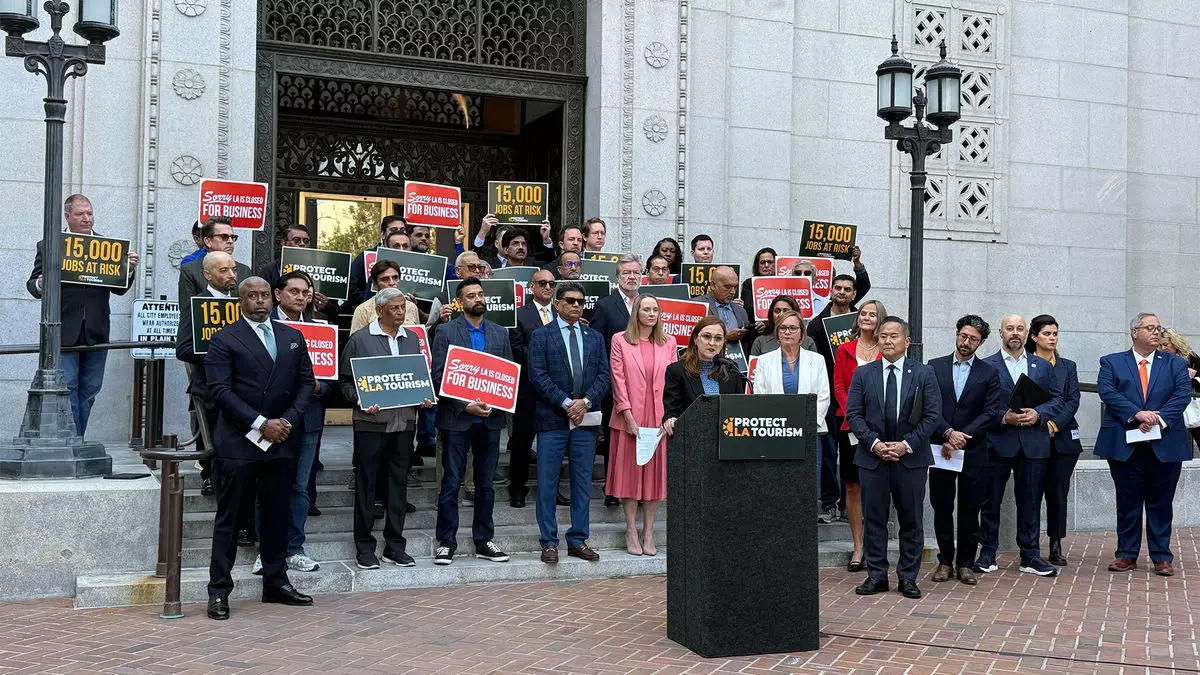Los Angeles is currently at a crossroads regarding labor rights, particularly for its tourism workforce, as discussions grow heated over a proposed $30 minimum wage for this sector. Dubbed the “Olympic Wage Ordinance,” the suggestion to raise the minimum wage for airport employees and hotel staff in larger establishments has ignited fierce debates among stakeholders. The proposed amendment to the city’s Living Wage Ordinance has brought together a diverse group of voices, each with its own vision of what is best for the future of tourism in the City of Angels.
On one side of the argument, hotel owners and industry advocates raise alarms about the potential fallout from such a wage hike. They argue that a drastic increase in payroll costs—by as much as 69% in just over two months—could jeopardize an industry still recovering from the double blows of the pandemic and severe wildfires. Key figures, including City Councilmember Traci Park, are concerned that this financial burden could lead to massive layoffs and the stalling of new developments in Los Angeles’ tourism infrastructure.
The Economic Impact of the Minimum Wage Increase
A report from the American Hotel & Lodging Association (AHLA), underscoring these concerns, cites an analysis suggesting that introducing the minimum wage hike could lead to the loss of approximately 14,000 jobs in the hotel sector alone. The potential economic ramifications are staggering: an estimated loss of $169 million in vital tax revenues and a staggering $342 million decline in hotel construction spending. Such numbers reveal the complex interplay between well-intentioned labor policies and the practical realities of a struggling industry trying to regain its footing.
Supporters of the wage increase, however, present a counter-narrative, asserting that these higher wages are essential for improving the living standards of tourism workers in Los Angeles, where the cost of living remains astronomically high. Labor organizations, such as Unite Here Local 11, passionately argue that the ordinance is not merely a financial burden; it’s a necessary measure for the stability of thousands of families who are at risk of being priced out of their homes—an issue inextricably linked to the greater housing crisis in California.
The Current State of Tourism in Los Angeles
Troublingly, Los Angeles has lagged behind other major U.S. cities in tourism recovery. While the city’s revenue per available room (RevPAR) has seen slight improvements, data reveal that many top markets have outpaced LA’s recovery benchmarks. This disparity leaves stakeholders anxious, especially with the anticipated influx of tourists during upcoming global events like the Super Bowl and the Olympics. Some proponents argue that these events provide an opportunity to turn the tide, but the ongoing struggle for a return to pre-pandemic levels looms large on the horizon.
In recent months, tourism operators have noted improved occupancy rates, heralding a welcome return to form. Optimism surrounding upcoming prominent events has given industry insiders hope that they might finally see the tourism renaissance they have long anticipated. Yet, this hope is matched by caution, as international travel remains stifled, significantly affecting overall market performance.
A Clash of Visions for the Future
The city’s tourism resurgence seems tantalizingly close, yet there remains deep-seated unease about the structural nuances of this recovery. Many industry players feel caught in a web of conflicting interests. As tourism organizations challenge the prevailing narrative of skyrocketing operating costs versus improving worker conditions, the battle for a living wage becomes a critical point of contention.
Ceaseless advocacy from labor unions keeps the spotlight on the necessity of providing workers with fair compensation, arguing vehemently that neglecting such factors in favor of cost-cutting could unravel any gains made in revitalizing the tourism sector. The conversation surrounding the wage hike is not simply a matter of dollars and cents but one that reflects deeper societal values regarding work, dignity, and community welfare.
Finding Balance: A Path Forward
As the city approaches critical decisions regarding the wage hike, leaders must grapple with the delicate balance between maintaining competitive tourism and ensuring that workers are not left behind. The dichotomy of viewpoints underscores a modern economic dilemma—a need for immediate recovery alongside a growing demand for equitable treatment of laborers. As stakeholders join forces to navigate this contentious landscape, it is evident that the outcomes will shape the future of L.A.’s tourism industry and the livelihoods of thousands who depend upon it.
In many ways, the decision regarding the Olympic Wage Ordinance serves as a barometer for larger economic and social issues in Los Angeles. It forces conflicting interests to confront their shared future within a city that relies heavily on tourism for its economic vitality while simultaneously demanding that workers receive fair treatment. The stakes have never been higher, and the voices from both sides of the aisle will undoubtedly continue to shape this ongoing debate.

